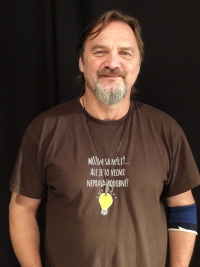The communists failed to realise that by imposing collectivism on us they also taught us how to fight collectively
Marian Lacko was born on 1 April 1962 in Rimavská Sobota. His parents had four children. Marián’s mother was born in Uhorské (now part of the Poltár District) and she worked as a court reporter. Marian’s father was born in Vyšná Pokoradz, a village which later became part of Rimavská Sobota. He was a secondary school teacher. Marian attended both primary school (1968 – 1977) and grammar school (1977 – 1981) in Rimavská Sobota. While at grammar school, he was an actor in the Poetry Theatre for four years. Between 1981 and 1986, he studied Slovak Language and Literature in combination with Arts at the Faculty of Education in Banská Bystrica. At the university, he was a member of the KNAP Student Theatre (A promising amateur actors club of students of pedagogy) at the Department of Slovak Language and Literature at the Faculty of Education in Banská Bystrica. After graduation, he started working as an independent professional officer at the Municipal Cultural Centre. He became involved in the Velvet Revolution during the general strike on 27 November 1989. He then became one of the three leading members of the coordination centre of the VPN (Public Against Violence) in the Rimavská Sobota district. He has been the director of the Primary Art School in Rimavská Sobota since 2004. Today, he still teaches and organises the LETAVY International Artistic Workshops.
